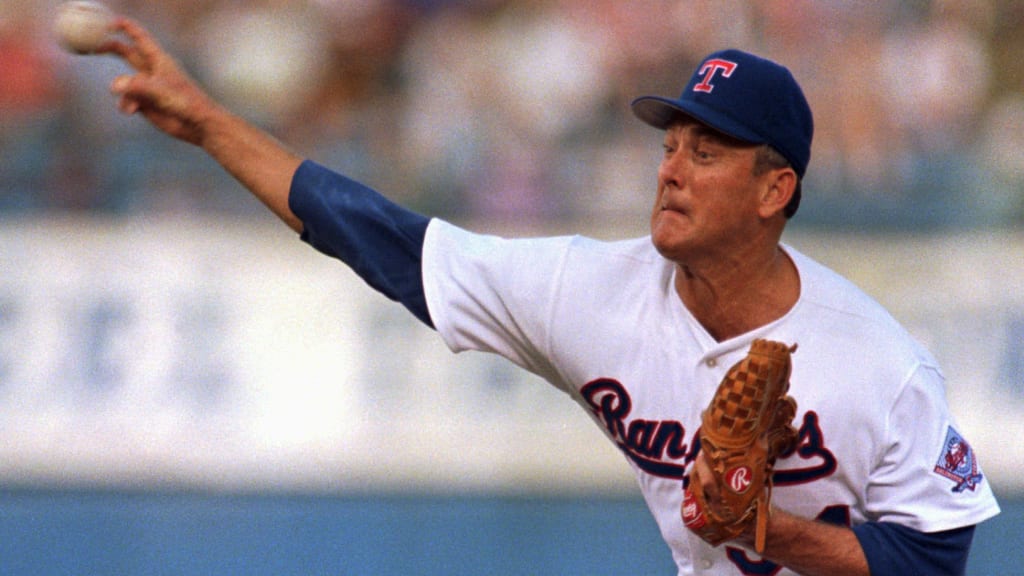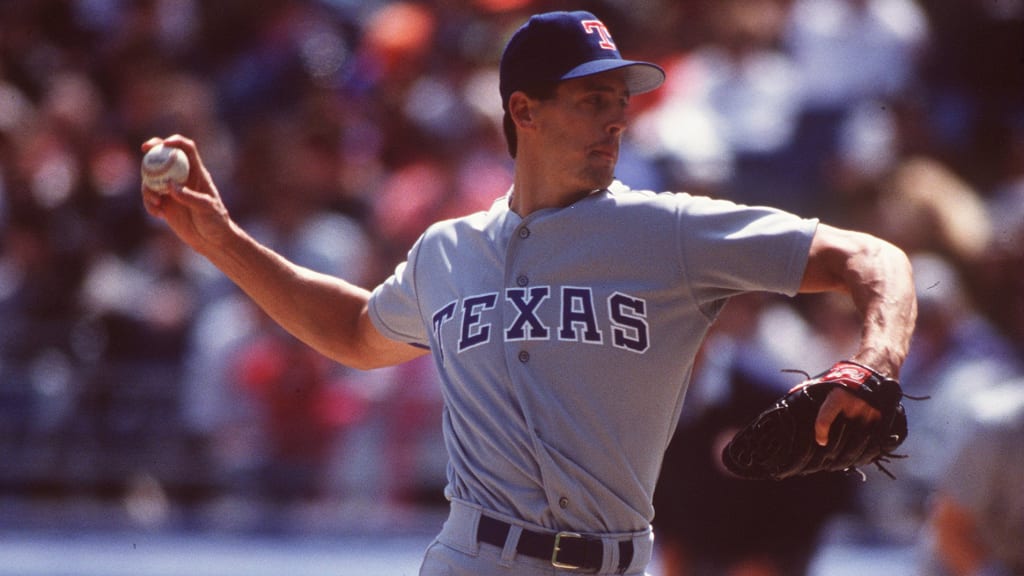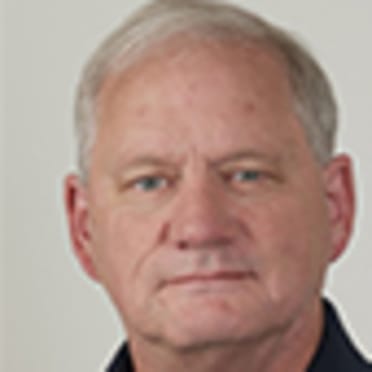
No one loves a good debate quite like baseball fans, and with that in mind, we asked each of our beat reporters to rank the top five players by position in the history of their franchise, based on their career while playing for that club. These rankings are for fun and debate purposes only … if you don’t agree with the order, participate in the Twitter poll to vote for your favorite at this position.
Here is T.R. Sullivan’s ranking of the top 5 right-handed starting pitchers in Rangers history. Next week: left-handed starters.
1) Nolan Ryan, 1989-93
Key fact: Two no-hitters, his 5,000th strikeout and 300th win were all achieved while with the Rangers.
Ryan made 129 starts over five years for the Rangers and was 42 when he started pitching for them. During those five years, opponents hit .197 off him, the lowest among qualifying Major League pitchers in that stretch. He also led with 10.1 strikeouts per nine innings and had a 1.13 WHIP that was the fifth lowest.
Ryan’s penultimate start came against the Angels on Sept. 17, 1993, in Anaheim. At the age of 46, Ryan went seven innings and allowed one unearned run and four hits with five strikeouts and no walks.
In his final outing against the Mariners, he allowed six batters to reach base, gave up five runs and did not record an out before leaving with what was determined to be a torn ligament in his right elbow.
Future Hall of Famer Dennis Eckersley said it best: “It was almost like he had to have his arm ripped off to stop pitching.”
2) Charlie Hough, 1980-90
Key fact: All-time Rangers leader in wins, innings pitched, games started, strikeouts, complete games and almost every other major category.
There was an afternoon at Arlington Stadium in 1986 when Hough walked past manager Bobby Valentine’s office. An All-Star that season, Hough had pitched the night before, earning one of his 17 wins.
“Charlie, we need to talk about when you are going to pitch again,” Valentine called out.
“When do you want me to pitch?” Hough asked.
“Tomorrow,” Valentine said.
One day rest? Maybe the manager was joking. Maybe not. Hough shrugged.
“I played golf today, but OK,” Hough said.
Hough may be the shrewdest acquisition in Rangers history. He had been a valuable reliever for the Dodgers from 1973-78, pitching in three World Series. He appeared to be on the downhill when Texas general manager Eddie Robinson purchased his contract on July 11, 1980.
Special assistant Paul Richards lobbied for the acquisition. Hough worked out of the Rangers’ bullpen until given a chance by Robinson and manager Don Zimmer to start at the end of the 1981 season.
Hough made five starts and went 4-1 with a 1.83 ERA and two complete games. He spent the next nine seasons in the Rangers’ rotation, averaging 15 wins and 240 innings a year. He had a 3.70 ERA and a 1.28 WHIP, and Texas had four winning seasons in Hough’s 11 years with the club.
3) Fergie Jenkins, 1974-75, ‘78-81
Key fact: Jenkins was 25-12 with a 2.82 ERA in '74. Those 25 wins, 328 innings pitched and 29 complete games are Rangers records that fall in the “never to be broken” category.
Rangers fans insist that Jenkins should have been the American League Cy Young Award winner in 1974, an award that ended up going to Catfish Hunter.
Both pitchers went 25-12 in 41 starts. Jenkins pitched 10 more innings with one more complete game. Hunter had a 2.49 ERA and a 0.99 WHIP, while Jenkins finished with a 2.82 ERA and a 1.01 WHIP. Jenkins had more strikeouts (225 to 143) and led the league with 1.2 walks per nine innings and five strikeouts per walk.
Hunter pitched for an Oakland team that won a third straight World Series. The second-place Rangers were 84-76 after going 57-105 the year before. Acquiring Jenkins from the Cubs was a big reason why the Rangers had that stunning turnaround.
Hunter won the award, receiving 12 of 24 first-place votes. Jenkins earned 10, while Gaylord Perry (Indians) and Ryan (Angels) each received one. Now, with all the analytics available, a case could be made for either Perry or Bert Blyleven winning that year.
4) Colby Lewis, 2002-04, ‘10-16
Key fact: Had a 4-1 record with a 3.11 ERA in nine starts and one relief appearance for the Rangers in postseason play.
Ryan, Hough and Jenkins are the top three right-handed starters in club history. Who are the next two?
Texas has had 42 right-handers make at least 50 starts. In that group, Lewis ranks 32nd with a 4.62 ERA as a starter. A 1.32 WHIP? That ranks 24th. Fielding Independent Pitching (FIP)? He ranks 22nd.
So why is he fourth on this list?
Because he helped the Rangers win four division titles. Plain and simple. Rick Helling, Aaron Sele, Ken Hill, John Burkett, Bobby Witt … all of them don’t have dazzling analytics while with the club. But they were the ones who helped the Rangers to the postseason.
Lewis is the best of the bunch. To the victors go the spoils.
5) Kevin Brown, 1986-94
Key fact: Only Rangers pitcher to start an All-Star Game (1992)
Best pitches in Rangers history?
Fastball: Ryan
Sinker: Brown
Changeup: Ryan
Curveball: Blyleven
Slider: Yu Darvish
Knuckleball: Hough
Splitter: Perry
Brown’s 98-mph sinker may be No. 1 on that list, just ahead of the Blyleven curve and Darvish slider.
Brown, the No. 4 overall pick in the 1986 MLB Draft, won 21 games and pitched 265 innings for the Rangers in 1992, the best of six full seasons in Texas. He largely underachieved, though, especially compared to his terrific work later with the Marlins, Padres and Dodgers.

Others receiving consideration
Helling is the most underrated player in Rangers history. Forget his numbers -- he pitched in the middle of the steroids era … Blyleven was a great acquisition for the Rangers in 1976, but he was traded away in ’77 … Perry deserves to be in the Hall of Fame, but not for what he did in his short time in Texas … Dick Bosman was the best of the Washington Senators pitchers ... A much longer story could be written about Darvish’s time in Texas. He pitched well when healthy, but losing time due to Tommy John surgery was a huge blow.
